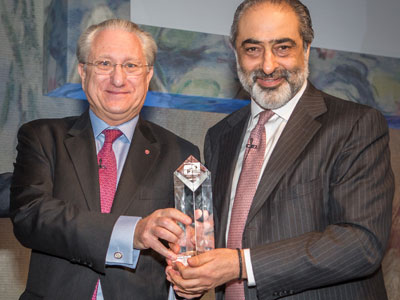Forum Report: International Hotel Investment Forum 2013
Nearly 2,000 delegates from 71 countries gathered in Berlin last week to attend the 16th International Hotel Investment Forum. Janet Harmer provides a snapshot of the discussions that went on, both inside and outside the key debates
IHG boss criticises UK government for dragging its feet on foreign visas
Richard Solomons, chief executive of InterContinental Hotels Group (IHG), said he was disappointed with the UK's slow progress in simplifying visa arrangements for foreign visitors.
"We spend time talking to the UK government," he told the delegates. "They listen, but I'm not sure they are hearing."
Solomons was speaking on a panel alongside fellow chief executives of some of the world's largest hotel companies: Chris Nassetta of Hilton Worldwide, Arne Sorenson of Marriott International and Frits van Paasschen of Starwood Hotels & Resorts Worldwide. Together, the four men are responsible for one-fifth of the world's hotels, nearly 2.5 million bedrooms, more than 50 brands and some one million employees.
In contrast to the UK, the panel praised the USA for taking steps to make it easier for travellers to cross its borders. "Obama has recognised that tourism is an easy means of creating economic growth and has made some powerful steps to help visitors to go to the USA," Sorenson said. "At one time it took a Chinese traveller 90 minutes to wait for a visa; now it takes just five minutes."
Nassetta said: "The US government is now focused on using tourism to drive incremental growth and create tens of millions of jobs."
Meanwhile, Solomons said he was concerned that travellers from emerging countries, such as China and India, would get used to going to other countries and give the UK a miss.
"London is high up as a destination of choice, but because of the difficulties of travelling to the UK, countries like Germany are getting five to six times the number of visitors from China," he said.
Livingstone questions legality of long-term management contracts The normally reclusive property developer Ian Livingstone created something of a stir at the forum when he suggested that long-term contracts between owners and operators could potentially be illegal under European law.
With hotel companies having moved in recent years to an asset-light method of operating, owner-developers like London & Regional Properties have come to the fore. Management contracts - typically 20 to 30 years long - are drawn up to determine the terms under which the operators will run the hotels on the owners' behalf. Some operators, such as Four Seasons Hotels & Resorts, have been known to command contracts as long as 50 years.
"Twenty-five years is too long for any service agreement," Livingstone said.
"It's impossible to know how a brand or operator will perform over that period of time. Management contracts should be able to be market tested and owners need flexibility to maximise their asset value."
Livingstone went on to say that such contracts should be limited to around five years as he believed that long-term versions could be illegal on the basis of being "anti-competitive or overly restrictive" under European law.
Outside the main conference arena, there was much chatter as to whether there was any basis in Livingstone's comments. Nick Skean Strachan, partner at law firm Berwin Leighton Paisner, said that if Livingstone's views were valid "someone would have made a fortune by now" helping hotel owners to get out of such contracts.
However, Karen Friebe, partner at law firm DLA Piper, said that the company is seeing more contracts for shorter terms. "And this is not just in situations where a short term manager is being brought in on an interim basis to manage an underperforming asset, say, pending a sale," she explained. "Some owners are no longer prepared to accept a long term contract, but whether an operator is willing to accept this will very much depend on the circumstances.
"We are also noting that owners are increasingly unlikely to accept automatic renewals of management contracts, following the expiry of the fixed term."
Regarding competition law, Friebe's colleague Alex Kamerling said: "Entering into a long term agreement can amount to a change of control and so a merger. In the UK merger control is voluntary, but in other jurisdictions such a transfer might have to be notified and cleared to be legal."
A spokesperson for IHG, which operates 293 hotels in the UK, said that its management contracts were typically for a 20-year term, although some owners had negotiated 25- or 30-year terms.
"We are not aware of any legislation which provides that long-term management agreements are illegal simply by virtue of the length of their terms," she added. "In our view, a 20-plus year management contract is legal and hotel owners are comfortable signing new management agreements and renewing existing agreements for this period."
Meanwhile, a Hilton Worldwide spokesperson said while details of individual management agreements were confidential, "we are confident that the terms of our agreements are mutually beneficial to both owners and Hilton Worldwide, while also complying with any applicable laws."
Majid Mangalji wins Lifetime Achievement Award Majid Mangalji said that he was "deeply honoured and humbled" to receive the IHIF 2013 Lifetime Achievement Award, on the final day of the conference.
Delegates were told how as a young boy Mangalji had escaped the atrocities of Uganda, which was then run by the despot Idi Amin, to start a new life with his family in Canada.
He went on to create the Westmont Hospitality Group, which has grown from a single hotel 
to become one of the largest 
private hotel owner/operators in the world.
Today the company has a financial interest in more than 500 hotels, including Hilton Worldwide, IHG, Fairmont, Accor, 
Starwood, Wyndham and Choice Hotels.
Future optimisim? Initial forecasts of the economic climate and talk of a lack of bank finance were replaced as the conference went on by a growing confidence that the sluggish hotel acquisition market is on the verge of a reversal of fortunes.
Thierry Malleret, managing partner of the Monthly Barometer, described the global economy as being in a state of "permanent disequilibrium". He said that companies that could adapt to the new transparent business environment would perform well, with emerging countries outperforming developed markets.
Outside the conference hall, though, the mood was more optimistic with the recent news of the sale of the Principal Hayley portfolio of 23 hotels and conference centres in the UK for a rumoured figure of £360m, buoying delegates for further major asset sales.
In particular, gossip was rife that the sale of sister boutique brands, Malmaison and Hotel de Vin, following the collapse into administration of parent company MWB, was imminent.
Skean Strachan said: "Finance is easier to come by now and as a result our pipeline of work is more solid than it was a year ago. The banks are doing more senior debt deals and development financing for some really good projects."









